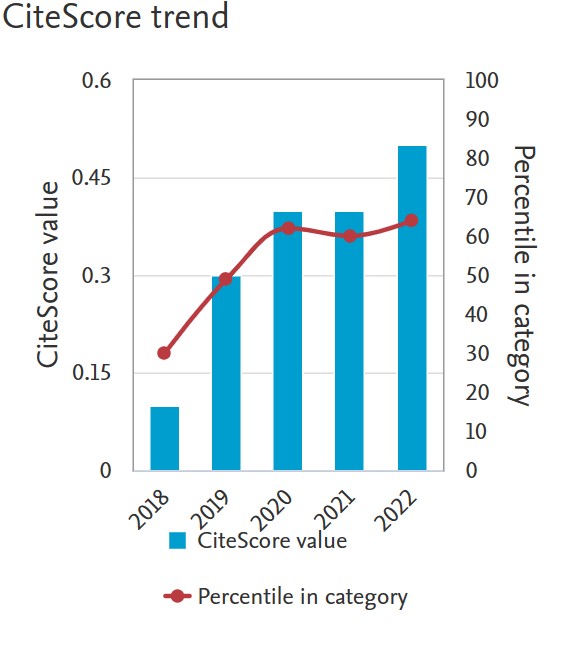Roles of Nursing Skills in Improving Quality of Rehabilitative Health Services for Patients with Chronic Conditions
Keywords:
Roles of Nursing Skills, Quality of Rehabilitative Health Services,Abstract
Background: The continuous quest to improve the quality of rehabilitative health services comes primarily to focus on controlling chronic diseases and coping with the treatment. The study aimed to investigate the roles of nursing skills in improving quality of rehabilitative health services for patients chronic conditions. Methods: This descriptive correlational study included 307 patients with chronic conditions who review specialized centers in Marjan Medical City in Babylon Province. The validity of the study questionnaire was achieved through a experts and reliability was achieved through a pilot study. Data were collected carried out on interview techniques and analyzed by applying the descriptive and deductive approach to statistical data analysis. Results: The results of the study indicated that the mean age is 51 (±9.86), participants were predominated (63.5%), the urban residents (79.2%), elementary and secondary school graduated (31.6%) each them, the employment (63.5). there were correlation coefficients indicate that there is a significant positive correlation between the role of nurses' skills to deal with patients with chronic conditions and the quality of rehabilitative health services as a whole (r=0.658; p=0.000). Conclusions: Nursing skills play a major role in improving the quality of rehabilitative health services, whether through verbal communication, listening, and persuasion. The need to hold training courses for human development on an ongoing basis about the skills of dealing with patients with chronic conditions for nursing workers, whether verbal communication skills, good listening skills and persuasion, because of their impact on the quality of the rehabilitative health service.
Downloads
References
Alfano CM, Cheville AL, Mustian K.
Developing high-quality cancer
rehabilitation programs: a timely need.
American Society of Clinical Oncology
Educational Book. 2016 May;36:241-9.
Holland AE, Cox NS, Houchen-Wolloff L,
Rochester CL, Garvey C, ZuWallack R,
Nici L, Limberg T, Lareau SC, Yawn BP,
Galwicki M. Defining modern pulmonary
rehabilitation. An official American
thoracic Society workshop report. Annals
of the American Thoracic Society. 2021
May;18(5):e12-29.
Grumi S, Provenzi L, Gardani A, Aramini V,
Dargenio E, Naboni C, Vacchini V, Borgatti
R, Engaging with Families through On-line
Rehabilitation for Children during the
Emergency (EnFORCE) Group.
Rehabilitation services lockdown during the
COVID-19 emergency: the mental health
response of caregivers of children with
neurodevelopmental disabilities. Disability and
Rehabilitation. 2021 Jan 2;43(1):27-32.
Sand-Svartrud AL, Berdal G, Azimi M, Bø I,
Dager TN, Eppeland SG, Fredheim GO,
Hagland AS, Klokkeide Å, Linge AD, Sexton J.
Associations between quality of health care and
clinical outcomes in patients with rheumatic and
musculoskeletal diseases: a rehabilitation cohort
study. BMC Musculoskeletal Disorders. 2022
Dec;23(1):1-4.
Hill H, Killaspy H, Ramachandran P, Ng
RM, Bulman N, Harvey C. A structured
review of psychiatric rehabilitation for
individuals living with severe mental illness
within three regions of the Asia‐Pacific:
implications for practice and policy. Asia‐Pacific Psychiatry. 2019 Jun;11(2):e12349.
Morris LD, Grimmer KA, Twizeyemariya A,
Coetzee M, Leibbrandt DC, Louw QA.
Health system challenges affecting
rehabilitation services in South Africa.
Disability and Rehabilitation. 2021 Mar
;43(6):877-83.
Altan F, Ekiyor A, Unalan D. Health Services
Delivery and Satisfaction. InQuality
Management for Competitive Advantage in
Global Markets 2021 (pp. 95-108). IGI Global.
Cramm JM, Nieboer AP. Self‐management
abilities and quality of life among frail
community‐dwelling individuals: the role
of community nurses in the Netherlands.
Health & Social Care in the Community.
Mar;25(2):394-401.
Nightingale S, Spiby H, Sheen K, Slade P.
The impact of emotional intelligence in
health care professionals on caring
behaviour towards patients in clinical and
long-term care settings: Findings from an
integrative review. International journal of
nursing studies. 2018 Apr 1;80:106-17.
Verhofstadt M, Van Assche K, Sterckx S,
Audenaert K, Chambaere K. Psychiatric
patients requesting euthanasia: guidelines
for sound clinical and ethical decision
making. International Journal of Law and
Psychiatry. 2019 May 1;64:150-61.
Gutenbrunner C, Stievano A, Nugraha B,
Stewart D, Catton H. Nursing–a core
element of rehabilitation. International
Nursing Review. 2022 Mar;69(1):13-9.
Salmond SW, Echevarria M. Healthcare
transformation and changing roles for nursing.
Orthopedic nursing. 2017 Jan;36(1):12.
Wanjau KN, Muiruri BW, Ayodo E. Factors
affecting provision of service quality in the
public health sector: A case of Kenyatta
national hospital, 2012.
Grotle M, Garratt A, Løchting I, Kjeken I,
Klokkerud M, Uhlig T, Hagen KB.
Development of the rehabilitation patient
experiences questionnaire: data quality,
reliability and validity in patients with
rheumatic diseases. Journal of rehabilitation
medicine. 2009 Jun 1;41(7):576-81.
Clarke JL, Bourn S, Skoufalos A, Beck EH,
Castillo DJ. An innovative approach to
health care delivery for patients with
chronic conditions. Population health
management. 2017 Feb 1;20(1):23-30.
Arnold EC, Boggs KU. Interpersonal
relationships e-book: professional
communication skills for nurses. Elsevier
Health Sciences; 2019 Feb 2.
Brzoska P, Sauzet O, Yilmaz-Aslan Y, Widera
T, Razum O. Satisfaction with
rehabilitative health care services among
German and non-German nationals
residing in Germany: a cross-sectional
study. BMJ open. 2017 Aug
;7(8):e015520.
Lynch EA, Cadilhac DA, Luker JA, Hillier
SL. Inequities in access to inpatient
rehabilitation after stroke: an international
scoping review. Topics in sTroke
rehabiliTaTion. 2017 Nov 17;24(8):619-
Frier A, Barnett F, Devine S, Barker R.
Understanding disability and the ‘social
determinants of health’: how does
disability affect peoples’ social
determinants of health?. Disability and
rehabilitation. 2018 Feb 27;40(5):538-47.
Juma Elywy G, Radhi MM, Khyoosh AlEqabi QA. Social Support and Its
Association With the Quality of Life (QoL)
of Amputees. Iranian Rehabilitation
Journal. 2022 Jun 10;20(2):253-60.
Downloads
Published
Issue
Section
License
You are free to:
- Share — copy and redistribute the material in any medium or format for any purpose, even commercially.
- Adapt — remix, transform, and build upon the material for any purpose, even commercially.
- The licensor cannot revoke these freedoms as long as you follow the license terms.
Under the following terms:
- Attribution — You must give appropriate credit , provide a link to the license, and indicate if changes were made . You may do so in any reasonable manner, but not in any way that suggests the licensor endorses you or your use.
- No additional restrictions — You may not apply legal terms or technological measures that legally restrict others from doing anything the license permits.
Notices:
You do not have to comply with the license for elements of the material in the public domain or where your use is permitted by an applicable exception or limitation .
No warranties are given. The license may not give you all of the permissions necessary for your intended use. For example, other rights such as publicity, privacy, or moral rights may limit how you use the material.











